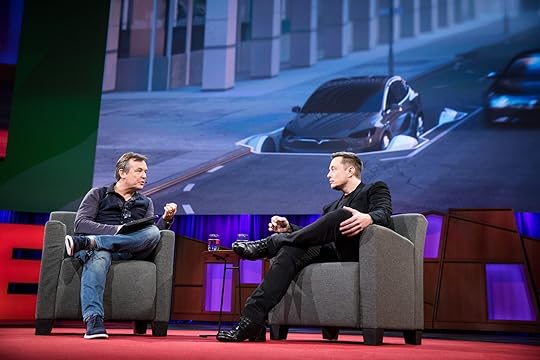Brian Burt's Blog: Work in Progress, page 3
May 7, 2017
#CauseForOptimism: Of TED Talks and Tesla and Tunnels and Trains
I love TED talks, especially those that focus on exciting visions of the future, but few can compare to the recent interview conducted by TED's Head Curator, Chris Anderson, with the legendary Elon Musk. If you haven't seen this wide-ranging discussion of where Musk's companies are striving to innovate next, then you owe it to yourself to check it out. If you're a science and technology fan, you'll find it fascinating; if you're an SF writer, you may pick up a few story ideas almost as astounding as the facts on which they're based.
This discussion covers a lot of ground... and underground. It begins with Musk's vision for a network of multi-level, subterranean tunnels he'd like to dig beneath cities like L.A. to alleviate the traffic gridlock. Why sit in a linear parking lot on a congested highway when you can drive onto an electric skate and have it propel you and your car through the commuter labyrinth at 200 kph while you sit back and relax?

Don't fancy traveling by car (even the self-driving kind, which Tesla is already pioneering on the roads today)? Then maybe you'd prefer the Hyperloop, a mag-lev train that SpaceX expects to shorten long-distance trips between cities by shooting through evacuated tubes or tunnels at 700 mph:
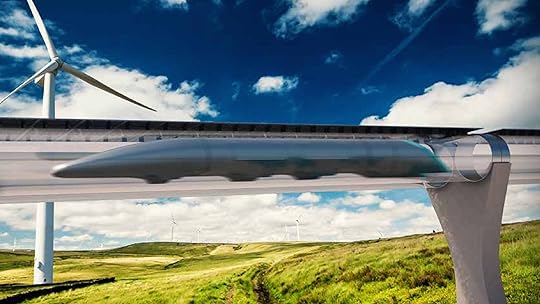
Are you more of a homebody? No problem. Tesla's new solar shingles can power your entire house, look great, and outlast the other building materials by centuries:

Are you the opposite of a homebody? Love adventure? Maybe you can catch a ride on SpaceX's next generation rockets, 5 times more powerful than the Saturn V, and start pioneering a human settlement on Mars to hedge our planetary bets against global cataclysm?
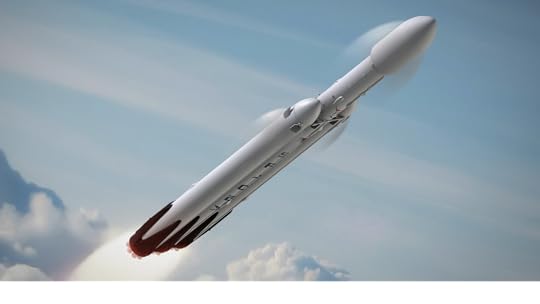
There's just so much to digest, to savor in this 40-minute chat with someone who (pardon the fan-boy enthusiasm) may ultimately be viewed through the lens of history as a Thomas Edison of our age. Are some of these ideas outlandish? Sure. Personally, I'm not convinced I want to be sliding through tunnels beneath L.A. so close to the San Andreas Fault. Still, Musk's passion for what he does is undeniable, infectious, and he's disproved his critics many times. Electric cars will never sell? Wrong. Reusable rockets are a pipe dream? Maybe not.
If you enjoy science and tech, this is a feast of imagination you won't regret. The line between genius and insanity may be fine... but it's definitely exhilarating!
TED 2017 -- Elon Musk: The Future We're Building... And Boring
#SFWApro
April 22, 2017
Living Dangerously on Earth Day
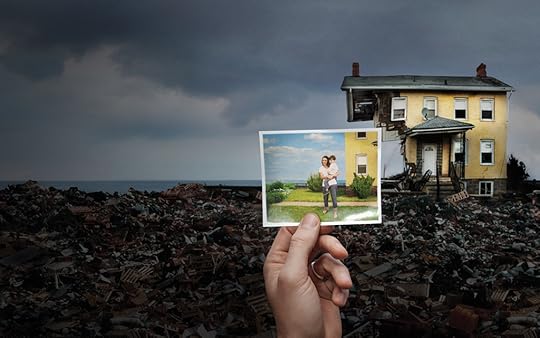
It's an exciting, momentous Earth Day, with the March for Science happening at many sites here in the U.S. and around the world. I feel a bit sidelined, unfortunately, recovering from surgery that only lets me march for short distances... and very, very slowly. My wife and youngest son are also feeling under the weather this weekend. So we decided to celebrate Earth Day by watching the first few episodes of the Emmy-winning series Years of Living Dangerously. It's been on our list for a while, but we don't get Showtime, so this "immobile" Earth Day finally provided the impetus to pull the trigger on buying Season 1. Best decision I've made in quite some time!
The first few episodes take viewers into many different places, with different perspectives on the effects of (and resistance to acknowledging) climate change. We see the impact of prolonged drought on small-town communities in Texas whose religious faith discourages acceptance of the science... until a devout Christian climate scientist from Texas Tech explains the implications in terms that don't insult their beliefs or alienate them. We see rampant corruption in Indonesia blindly ignoring an explosion of palm oil plantations that devastate the national forests that once served as a crucial carbon sink for the planet. We see Syrian refugees share their personal traumas and make clear that the fundamental catalyst for the human catastrophe in their home country was the most relentless drought in their region's recorded history; only when their government ignored their pleas for help did they resort to revolution.
And we see Western U.S. "hotshot" firefighters battling massive forest fires that have become steadily more deadly and numerous over the past several decades. These heroes don't question the science behind climate change because they're living (and dying) it every day.
It's arresting viewing. I love the written word and favor the novel over the film almost every time. But, in the case of issues like climate change and their impact in the real world, video evidence reaches may of us in a visceral way that books struggle to match.
So, on this Earth Day 2017, I highly recommend Years of Living Dangerously for anyone who hasn't had the pleasure of viewing it. As a passionate reader and writer of science fiction, I place great value on the contributions of science toward making our world better... and on warning us when we're on the brink of doing it irreparable harm. If you can't march today, maybe you can watch!
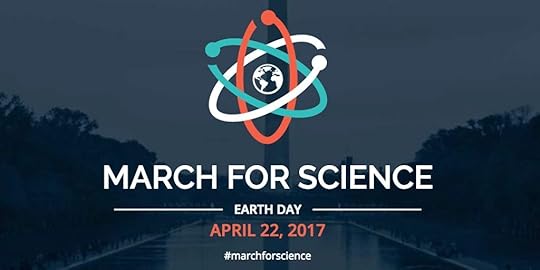
#SFWApro
April 8, 2017
#CauseForOptimism: Catalyst for CO2 Conversion
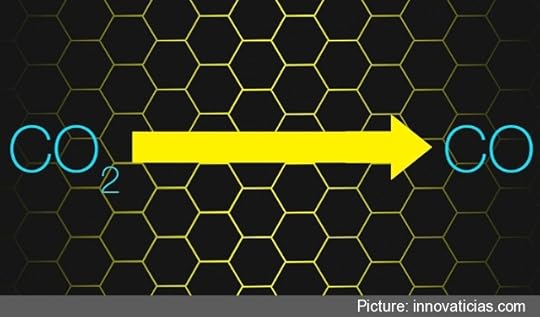
Like me, you may be concerned about the sweeping policy changes unveiled by the new U.S. administration in relation to climate change. Both scientific research funding and regulatory enforcement appear to be under siege. As somebody who has written a science fiction trilogy driven by the catastrophic impacts of climate change on a future Earth -- and who has been moved by "climate fiction" novels like Barbara Kingsolver's Flight Behavior -- this generates an alarming sense of life imitating art.
So, when I see a story like the one I'm about to share, it injects that precious burst of optimism that we all need (desperately ;-) from time to time.
Researchers invent novel catalyst to convert carbon dioxide
Research chemists from the University of Amsterdam recently stumbled upon a catalyst that efficiently converts carbon dioxide to carbon monoxide, which can then be used to create useful chemicals. This new catalyst is cheap, easy to prepare, and operates at ambient pressure and low temperatures. If it scales up as expected, it can be applied at an industrial scale to potentially transform large volumes of an environmentally damaging greenhouse gas into a useful resource. Wicked cool!
So major kudos to the wizards at UvA's Sustainable Chemistry research area for distilling atmospheric lemons into lemonade. When things look dark, science shines a light of hope for a better future. That's why it deserves our support, respect, and government funding. American scientists are ready, willing, and able to provide this kind of #CauseForOptimism. We just need to keep giving them that chance!
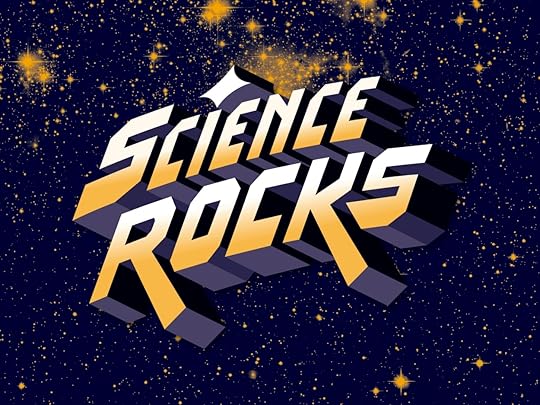
#SFWApro
March 5, 2017
#CauseForOptimism: Ultrasound Blasts Alzheimer's

My past blog posts have shared some of my family's own struggles with Alzheimer's disease, to me the cruelest (and most personally terrifying) illness any person can confront. That's one reason why I'm always interested in any emerging medical research related to Alzheimer's treatments and follow the (credible) media reports avidly. If you haven't directly had a friend or family member afflicted with this insidious disease, then you almost certainly know someone who's not so lucky.
That's why it's wonderful to come across new research out of Australia that offers hope to Alzheimer's sufferers and their families.
Alzheimer's breakthrough: ultrasound successfully treats disease in mice
The Australian research team used "focused therapeutic ultrasound," a technique that beams rapidly oscillating sound waves into brain tissue. They found that this stimulates the brain's own microglial cells to marshal their waste removal forces and clear the toxic beta-amyloid plaques that are believed to be responsible for the worst symptoms of the disease. In laboratory studies with plaque-producing mice, more than three-quarters of the animals were completely cleared of plaques with no tissue damage.
Now that's an Eternal Sunshine of the Spotless Mind I can embrace!
So that's my favorite Cause for Optimism so far in 2017. Never thought I'd be so excited at the prospect of being brain-washed... but here's hoping our friends from Down Under will give that term a whole new meaning!

#SFWApro
February 8, 2017
Rekindling the Light of Science

I find the recent declarations that we're now living in a "post-fact society" to be both depressing and terrifying. I'm a science fiction reader / writer. I love science, respect its power to improve our lives and transform our world. I firmly believe that the precepts of the scientific method -- rational debate based on analysis of actual evidence, tempered with a healthy dose of skepticism towards unsubstantiated claims by authority figures -- are crucial not just to advancing science but to maintaining a functional democracy.
Let's face it. When sales of the novel 1984 spike by 10,000 percent on Amazon, that's not an encouraging sign.
I actually took solace from a different book my wife brought home from a recent local library sale, one written by renowned science popularizer Carl Sagan more than two decades ago. The Demon-Haunted World, subtitled "Science as a Candle in the Dark," bemoans the way American culture has abandoned scientific rationality in the face of a growing onslaught of disinformation from politicians, advertisers, special interests, and corporate spin-doctors. Science was fundamental to the mindset of our founding fathers and has always been a source of pride, innovation, and excellence for America. Not so much anymore. The statistics Sagan cites about scientific literacy in the U.S. vs. other Western nations are humbling. We used to lead in science and technology. Now, our average citizens have fallen so far behind that they can barely see the backs of the competition. More dangerously, they struggle to unravel the competing claims that bombard them constantly online, on social networks, and in the media. It's very hard to spot fake news without a basic understanding of how to sift compelling evidence from propaganda.
Sagan believed that re-embracing our respect for science, our heritage of promoting science in education and in public discourse, can get us back on track. He summed things up beautifully here:
Science thrives on, indeed requires, the free exchange of ideas; its values are antithetical to secrecy. Science holds to no special vantage points or privileged positions. Both science and democracy encourage unconventional opinions and vigorous debate. Both demand adequate reason, coherent argument, rigorous standards of evidence and honesty. Science is a way to call the bluff of those who only pretend to knowledge. It is a bulwark against mysticism, against superstition, against religion misapplied to where it has no business being. If we're true to its values, it can tell us when we're being lied to. It provides a mid-course correction to our mistakes. The more widespread its language, rules, and methods, the better chance we have of preserving what Thomas Jefferson and his colleagues had in mind...
If we don't practice these tough habits of thought, we cannot hope to solve the truly serious problems that face us -- and we risk becoming a nation of suckers, a world of suckers, up for grabs by the next charlatan who saunters along.
These words may have been written more than 20 years ago, but Sagan clearly saw the trajectory we were on, and they couldn't ring more true today. So here's hoping we all rise up and demand facts from our leaders, not fancy verbal gymnastics or loudly shouted opinions. Fiction is wonderful as a source of entertainment. It isn't a strategy for governing... and our leaders have relied on it for far too long.
So hold your candles high, fellow members of the SF community. May they burn away the black waves of BS!

#SFWApro
January 2, 2017
#CauseForOptimism: Google Goes Green in 2017!

As the new year dawns, we can all use a reason to greet it with optimism. I'm a fan of Google's technology, using it liberally in both my personal and professional lives. Heck, as a writer, I have to respect a company who managed to transform their name into a verb! Google leads in the world of the modern web, in cybersecurity... and, now, also in the realm of renewable energy.
In December, Google announced their intention to derive 100% of their corporate energy needs from green power sources in 2017. As you can see in the chart below, Google is far ahead of competitors in the private and public sector, although Amazon and our U.S. Department of Defense aren't doing badly, either.

Here's a quote from Google's blog post on this announcement (We’re set to reach 100% renewable energy — and it’s just the beginning) that sums things up beautifully:
The science tells us that tackling climate change is an urgent global priority. We believe the private sector, in partnership with policy leaders, must take bold steps and that we can do so in a way that leads to growth and opportunity. And we have a responsibility to do so — to our users and the environment.
Awesome! So let's all applaud Google for this most epic and visionary of New Year's resolutions. May they inspire other leading companies, in the U.S. and around the world, to follow their example. 2017 has the potential to be a paradigm-shifting year. Let's make the climate great again! ;-)
#SFWApro
December 18, 2016
The New Definition of Political Hack

For my day job, I work in cybersecurity. To people in my line of work, the "revelation" that Russia engaged in a systematic (and highly effective) disinformation campaign on social media to influence the U.S. Presidential election isn't a controversial assertion. To most expert sources in my industry, it's more of a "d'uh" moment, as in: "we've been warning you about this for years, and now you're surprised by this?"
News flash, folks: this isn't shocking or unforeseen. The Russians have been refining their craft and figuring out how best to hack elections (usually by targeting voters, not voting systems) for a long time. Here are few historic examples:
Ukraine election narrowly avoided 'wanton destruction' from hackers
The Dutch just showed the world how Russia influences Western European elections
And, of course, the threat doesn't end now that the U.S. election is over. There are signs, and growing concerns, that Russia intends to repeat the cyber-playbook that proved so successful in the U.S. to target upcoming elections in France, Germany, and the Netherlands: Europe ready for CYBERWAR over fears Russia will hack Germany, France and Netherlands vote.
So President-elect Trump and his transition team can repeat their claims that "nobody knows" who hacked the DNC and John Pedesta, feeding embarrassing emails via Wikileaks steadily throughout the home stretch of the Presidential campaign. Sure, our entire national intelligence apparatus has concluded with extremely high confidence that the Russians were behind this, and the fake news onslaught on social media, but they've been wrong before, most notably about WMD's in Iraq. Truth be told, though, they're more often right than wrong... and they're not alone in their conclusions. Most security experts worldwide agree with them. Even staunch Republican political fixtures like Senator John McCain don't doubt Russia's election hacking in the least and believe it's a dire threat both at home and abroad: McCain: Russian election-related hacks threaten to 'destroy democracy'.
I'm not for a moment implying that the recent U.S. Presidential election result should be invalidated or that the electoral college should delay its "official vote." The election is over. We have a new administration forming. Any attempt to disrupt the transition just increases the level of chaos and gives Russia an even bigger victory than they've already achieved.
But President Trump, his cabinet, and the U.S. Congress better not ignore the reports from the intelligence community. They better take the Russian hacking threat seriously, investigate it thoroughly, learn important lessons from it, and implement programs to mitigate the risk of a repetition in the future. Because cyber-warfare (even if it's "cyber-psyops") is a reality. Cyberspace is indeed a real theater of operations for nation-states and their militaries. And people's perceptions are much easier to hack than electronic voting systems or DoD networks.
We science fiction writers and readers are predisposed to accept the new reality. We've had decades of brilliant stories like William Gibson's immortal Neuromancer to prepare us. Still, some of our less tech-savvy brethren may struggle to understand just how dangerous disinformation can be in an information-driven, networked world. Let's hope and pray that our national (and global) leaders don't hide from yet another inconvenient truth.

#SFWApro
November 27, 2016
#CauseForOptimism: CO2-2-Ethanol!

Here's another cause for optimism that is both encouraging and wicked cool. (Man, I love science! ;-) Yet another potential technological breakthrough for which to give thanks during this holiday season!
In a new twist to waste-to-fuel technology, scientists at the Department of Energy’s Oak Ridge National Laboratory have developed an electrochemical process that uses tiny spikes of carbon and copper to turn carbon dioxide, a greenhouse gas, into ethanol. Their finding, which involves nanofabrication and catalysis science, was serendipitous.
According to ORNL’s Adam Rondinone, lead author of the team’s study published in ChemistrySelect:
“We discovered somewhat by accident that this material worked. We were trying to study the first step of a proposed reaction when we realized that the catalyst was doing the entire reaction on its own.”
Okay, so effectively reversing the combustion process to turn CO2 back into a clean, combustible fuel like ethanol isn't a magic bullet or a miracle cure for global warming. Still, it's an impressive achievement and, if it scales, could be invaluable in making a renewables-based energy grid more practical. Here is the team's insight in that regard:
“A process like this would allow you to consume extra electricity when it’s available to make and store as ethanol. This could help to balance a grid supplied by intermittent renewable sources.”
Here's to the role of luck, perceptiveness, and serendipitous discovery in the world of scientific research. May it fill all of us with hope and #CauseForOptimism! The full article can be viewed here:
Nano-spike catalysts convert carbon dioxide directly into ethanol
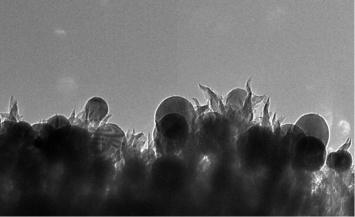
#SFWApro
November 20, 2016
Change (as in Climate) Isn't Always Good

I realize that folks in the States are utterly burned out on the presidential election... but I'm a science fiction writer. I care about science, about evidence-based policy, and about rational decisions that shape the future of our species on this planet. So bear with me as I post an open letter to President-elect Trump, the soon-to-be leader of the free world.
Disclaimer: I have friends who voted Republican, friends who voted Democrat, and friends who decided to vote for a 3rd-party candidate. I consider all of them to be intelligent, concerned citizens who voted their conscience. This isn't intended to be a rant. Half of our country isn't uniformly "good" or "bad" because of their political party leanings; that's just a silly and intellectually lazy cop-out. But this is an issue about which I care, passionately, and I hope our polarized nation can somehow reach a logical compromise. So... here we go.
An Open Letter to President-Elect Trump on Climate Change: You Got it Right the First Time
To President-Elect Trump:
Congratulations on your electoral triumph. In your victory speech, you confirmed your commitment to represent all Americans and called for unity. That's wonderful, and exactly the tone we need at this juncture in our nation's political history. You've pledged to listen to all of your citizens, not just the ones who voted for you. I take you at your word, sir, and ask you to consider this plea in relation to a crucial issue, not just for America but for the entire world.
When it comes to the issue of climate change, Mr. Trump, you got it right the first time.
In 2009, you joined a group of business leaders in exhorting the (then) new president, Barack Obama, to step up to the most serious existential threat to humanity on this planet. You and three of your adult children signed an open letter published in the New York Times in December of that year, asking President Obama and Congress to lead by example at the U.N. Climate Conference in Copenhagen.

Specifically, you and the other signatories affirmed the following:
"We support your effort to ensure meaningful and effective measures to control climate change, an immediate challenge facing the United States and the world today. Please don't postpone the Earth. If we fail to act now, it is scientifically irrefutable that there will be catastrophic and irreversible consequences for humanity and our planet... We have the ability and the know-how to lead the world in clean energy technology to thrive in a global market and economy. But we must embrace the challenge today to ensure that future generations are left with a safe planet and a strong economy."
You were absolutely right in 2009. Since that time, the evidence for global warming has only mounted, and the scientific consensus has grown to more than 97% of climate scientists on the planet.
You have (rightfully) extolled the virtues of the U.S. military and placed the welfare of veterans at the center of your policy agenda. Clearly, you have great respect for our military. To the U.S. Department of Defense, climate change is not a matter of debate: rather, it is "an urgent and growing threat to our national security." According to the DoD's National Security Report of July 2015, "these impacts are already occurring, and the scope, scale, and intensity of these impacts are projected to increase over time." ( Congressional Report on National Security Implications of Climate-Related Risks and a Changing Climate, 23 July 2015 )
Your party has also emphasizes the central role of religious faith in informing your policy and platform positions. It's important, then, to recognize that nearly every major world religion acknowledges the reality of climate change and the moral responsibility of humans to safeguard God's Creation ( Religious Statements on Climate Change ). This includes a majority of Christian faith traditions: Anglican, Baptist, Catholic, Episcopalian, Evangelical, Mennonite, Methodist, Presbyterian, Quaker, United Church of Christ, etc.
Climate change is not a hoax perpetrated by the Chinese or a scam coordinated by scientists to secure research funding. Literally 99.9% of peer-reviewed scientific publications on this subject conclude that climate change is real and primarily due to human actions. As you recognized in 2009, this is one of the most critical challenges facing our country and the world. We can't pretend it doesn't exist. We need to act, decisively, to protect the futures of our children and grandchildren.
You are our president now, sir. You bear the burden of leadership for all Americans. And -- more than any president in modern memory -- you have achieved the highest office in the land without being beholden to special interests. Don't surrender to pressures from the fossil fuel industry. You've promised to "drain the swamp" in Washington. Don't drill for oil after you've drained it; that's exactly what the special interests want!

#SFWApro
November 12, 2016
#CauseForOptimism: The Book of Joy

I have to admit, it's been a brutal week filled with political turmoil here in the U.S. of A. That's why I'm so grateful for the chance to read The Book of Joy: Lasting Happiness in a Changing World, a transcendent chronicle of conversations between two of the most influential spiritual leaders of the past century: the Dalai Lama and Archbishop Desmond Tutu. At a time when Americans seem more divided than ever, it's a pleasure to immerse oneself in the wisdom of two people who have endured oppression beyond the comprehension of the average American citizen without losing their compassion, their sense of humor, or their joy for living.

These two gentlemen, from such utterly disparate backgrounds, have proven to be kindred spirits. In fact, they put the "spirit" in spirituality. They don't focus on their religious differences; instead, they revel in the common ways a Tibetan Buddhist monk and a South African bishop of the Anglican Christian Church have found to strive to achieve joyful lives. The secret? Humility, compassion, and generosity toward their fellow men... even those who have persecuted them. These are people of immense moral strength. They recognize that modern society's obsession with wealth -- with "bank accounts as the scorecard for human value" -- is terribly misguided. It pushes us down a dark, dismal path that ultimately leads to individual unhappiness and collective misery. When we, instead, focus on the welfare of others instead of self, we elevate our own joy and the joy of those around us. Win-win!

I'm not a traditionally religious person. My wife is Wiccan, and I'm devoutly non-denominational ("religiously undecided"). I'm a speculative fiction writer who puts more stock in science than religion. Still, I can recognize the wisdom in the words and perspectives of these two exceptional human beings. I can discern the profound truth in what they have to share with the rest of us. In these turbulent times, we can all benefit from the guidance of experts on how to find joy in the act of helping others.
If you read it without preconceptions, The Book of Joy could do more than change your mind. In fact, it could change your life. I highly recommend it. Joy is elusive... but you can find it without relying on any politician!

#SFWApro
Work in Progress
- Brian Burt's profile
- 51 followers


